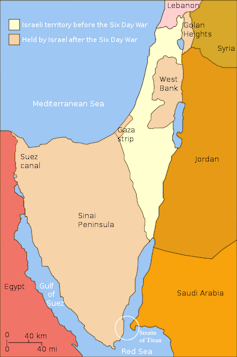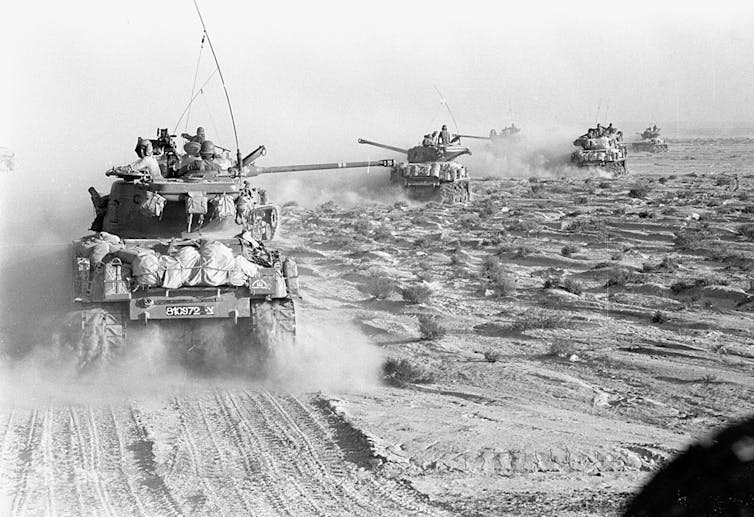Israel’s prime minister, Benjamin Netanyahu, describes his nation’s struggle in opposition to Hamas as Israel’s “second struggle of independence”. The primary was fought in 1948, however the struggle that gave Israel management of Gaza came about 19 years later.
The six-day struggle between Israel and its Arab neighbours in 1967 was fought amid intense superpower pressure and vivid worldwide fears that it’d unfold.
Having spent a profession as a information journalist, usually reporting from battle zones, I now analysis UK newspaper protection of main historic occasions. Printed newspaper archives from the time reveal prescience amongst UK correspondents overlaying the six-day struggle. Even in 1967, it appears, it was turning into clear that the battle between Israelis and Palestinians – and between Israel and its Center Japanese neighbours – had the potential to fester for many years.

Ling.Nut/Wikimedia Commons, CC BY-SA
From Tel Aviv, Charles Douglas-Residence of The Instances recognized issues more likely to come up from Israel’s navy success. “Israel has gained one other battle”, he defined, “however who can say that she has gained the struggle?” Douglas-Residence predicted that the Jewish homeland would exist “in a cycle of eruption each decade” if it couldn’t resolve “the issue of the refugees”.
It was ironic, he advised, that the refugee disaster had “turn into an inner matter whereas earlier than it was studiously stored outdoors”. Nonetheless, speedy Israeli advances had left 250,000 Palestinian refugees minimize off from any escape into Egypt of which, till 1967, the Gaza Strip was half. Douglas-Residence predicted that “a long-term inner safety drawback” now confronted Israel.
Learn extra:
Israel-Hamas struggle: six key moments for the Gaza Strip
John Dickie, the diplomatic editor of the mass circulation conservative Every day Mail recognised the worldwide challenges. Within the quick time period, the USSR can be weakened by the navy failure of its proxies Egypt and Syria. Nonetheless, he added, “Arab needs for revenge are more likely to strengthen”. Dickie feared Israel’s neighbours can be decided to “qualify for nuclear standing”.
Wishful considering
On behalf its readership of Labour-supporting Britons, the Every day Mirror hoped that Israeli success might carry safety for the area and the world. In a front-page editorial, the Mirror posed “the essential questions”: would Russia and America work collectively to plan “an enduring political settlement?” Would “victorious Israel be prudent sufficient – regardless of her large territorial conquests within the struggle – to be modest and beneficiant in her political calls for on the Arab states?”. Would “the Arabs jettison their fanatical delusion that Israel doesn’t actually exist – and conform to exist facet by facet”?
The Mirror concluded that although Britain and America had been Israel’s staunch supporters, they “can’t alone conjure Arab-Israel coexistence out of the blood on the sand”. Israel must present magnanimity in victory. It should grant the Arabs “peace and time and assist to construct their very own prosperity”. Preventing once more can be futile. Israel’s Arab enemies would quickly be taught that “the USSR doesn’t again losers twice”.
For its extremely educated readership, The Manchester Guardian’s Harold Jackson reported from Tel Aviv that the navy victory was “unprecedented in fashionable occasions”. Israeli forces had gained with out exterior assist “as a result of they’d the higher military”. The gear accessible to every facet was comparable, however “wars are gained by males and the Israelis had the supreme benefit right here”.
Jackson famous that Israel had not issued official casualty figures, solely an assurance that they had been “comparatively gentle”. He mirrored that: “Seeing line after line of Egyptian our bodies within the Gaza strip makes one marvel what the Israeli losses are relative to.”

IDF and Protection Institution Archive/Wikimedia Commons
The Observer, owned in 1967 by the Astor household, provided extra sophistication. The steadiness of energy within the Center East had modified profoundly and quick. “Audacious generalship” and superior navy effectivity had given Israel “a improbable success”. Now “a gentle nerve and correct self-assurance” can be important if the Jewish state was to achieve “the inherently a lot more durable process of constructing a sturdy peace”.
Chilly struggle within the Center East
The Economist contributed understanding of the chilly struggle context. If Egyptian president, Gamal Abdel Nasser, and his Syrian and Jordanian allies had gained “the USSR would have acquired standing and affect”. Moscow might need exploited this to place renewed stress on America over its function in Vietnam. As a substitute Israel had prevailed. Now, any “ultimate peace settlement would imply doing one thing about these refugees”.
The subtle weekly title acknowledged that the populations of Gaza and the West Financial institution “have been wilfully misused by the Arab governments”. Nonetheless, whereas terrorist teams ought to be expelled from the Gaza strip, in return for Arab recognition of its proper to exist Israel should recognise the plight of these left stateless and destitute.
If the echoes from 1967 sound acquainted 56 years later, we must always acknowledge that this has lengthy remained a smouldering battle, by no means a frozen one. Keir Starmer would recognise the Labour Occasion dilemma described in 1967 by Nora Beloff, pioneering feminine political correspondent for the Observer.
Writing because the six-day struggle got here to an finish, Beloff predicted that the UK’s Labour prime minister, Harold Wilson, was going to have a tough time retaining his authorities and occasion collectively as peace was negotiated. Reluctant to recognise Israel after its institution in Might 1948, Labour remained “sharply divided” between pro-Arab and pro-Israeli MPs.
The same dilemma confronts the opposition chief as we speak as he tries to reconcile opposing views inside his personal occasion in parliament and past.




